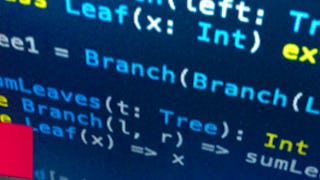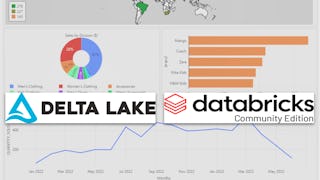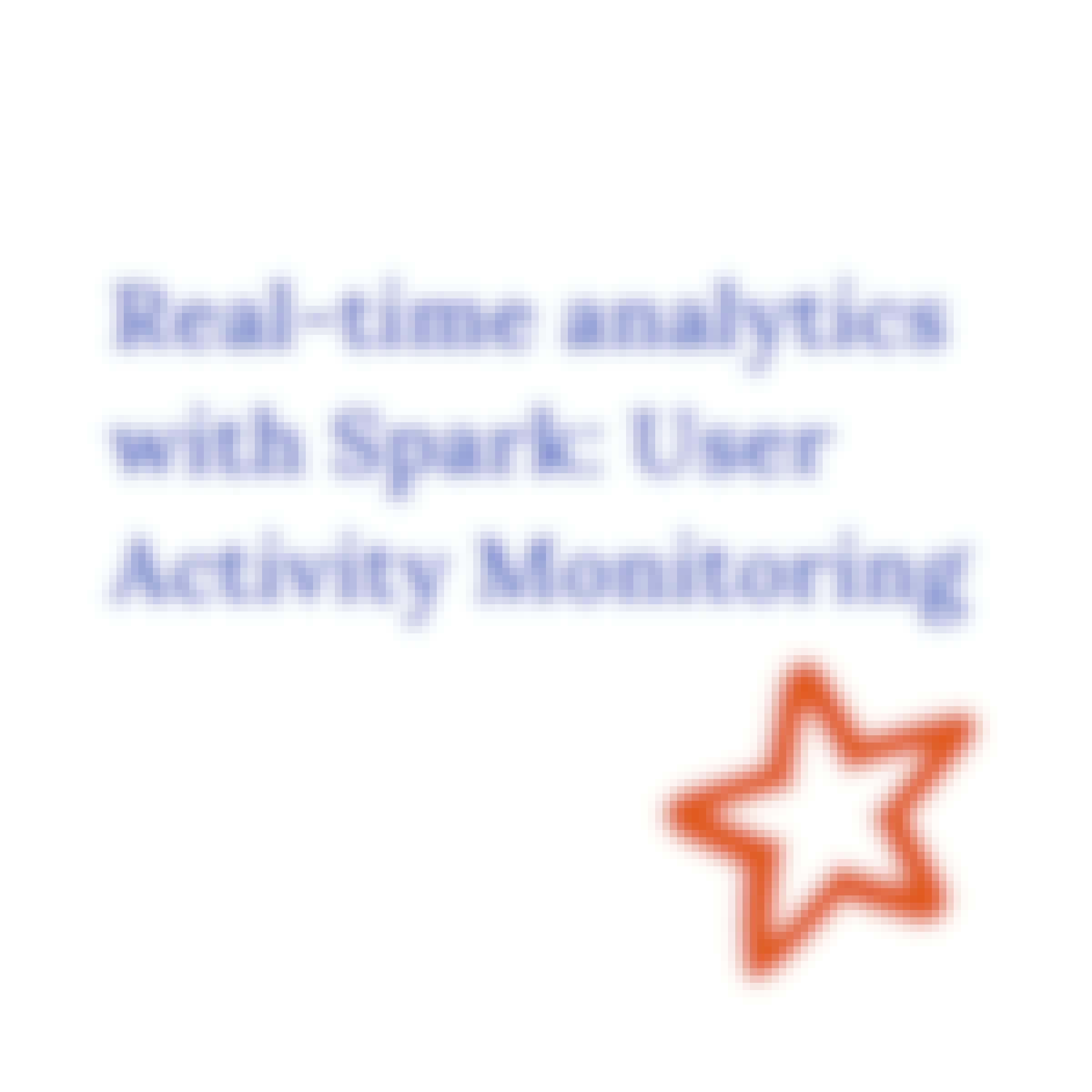- Browse
- Pyspark
PySpark Courses
PySpark courses can help you learn data manipulation, distributed computing, and data analysis techniques. You can build skills in working with large datasets, performing transformations, and executing machine learning algorithms. Many courses introduce tools like Apache Spark and its libraries, that support processing big data efficiently and integrating with AI applications.
Popular PySpark Courses and Certifications
 Status: NewNewStatus: Free TrialFree Trial
Status: NewNewStatus: Free TrialFree TrialSkills you'll gain: PySpark, Apache Spark, MySQL, Data Pipelines, Scala Programming, Extract, Transform, Load, Customer Analysis, Apache Hadoop, Classification And Regression Tree (CART), Predictive Modeling, Applied Machine Learning, Data Processing, Advanced Analytics, Big Data, Apache Maven, Statistical Machine Learning, Unsupervised Learning, SQL, Apache, Python Programming
4.6·Rating, 4.6 out of 5 stars37 reviewsBeginner · Specialization · 1 - 3 Months
 Status: NewNewStatus: Free TrialFree Trial
Status: NewNewStatus: Free TrialFree TrialSkills you'll gain: PySpark, MySQL, Data Pipelines, Apache Spark, Data Processing, SQL, Data Transformation, Data Manipulation, Distributed Computing, Programming Principles, Python Programming, Debugging
4.6·Rating, 4.6 out of 5 stars34 reviewsMixed · Course · 1 - 4 Weeks
 Status: Free TrialFree Trial
Status: Free TrialFree TrialSkills you'll gain: PySpark, Apache Spark, Apache Hadoop, Data Pipelines, Big Data, Data Processing, Distributed Computing, Data Analysis Expressions (DAX), Data Integration, Data Transformation, SQL, Data Manipulation, Data Cleansing
2.8·Rating, 2.8 out of 5 stars8 reviewsIntermediate · Course · 1 - 3 Months
 Status: Free TrialFree TrialÉ
Status: Free TrialFree TrialÉÉcole Polytechnique Fédérale de Lausanne
Skills you'll gain: Apache Spark, Apache Hadoop, Scala Programming, Distributed Computing, Big Data, Data Manipulation, Data Processing, Performance Tuning, Data Transformation, SQL, Data Analysis
4.6·Rating, 4.6 out of 5 stars2.6K reviewsIntermediate · Course · 1 - 4 Weeks
 Status: Free TrialFree TrialD
Status: Free TrialFree TrialDDuke University
Skills you'll gain: PySpark, Snowflake Schema, Databricks, Data Pipelines, Apache Spark, MLOps (Machine Learning Operations), Apache Hadoop, Big Data, Data Warehousing, Data Quality, Data Integration, Data Processing, DevOps, Data Transformation, SQL, Python Programming
3.9·Rating, 3.9 out of 5 stars61 reviewsAdvanced · Course · 1 - 4 Weeks

Skills you'll gain: Databricks, Data Lakes, Data Pipelines, Data Integration, Dashboard, PySpark, SQL, Apache Spark, Data Management, Data Transformation, Version Control
4.2·Rating, 4.2 out of 5 stars31 reviewsIntermediate · Guided Project · Less Than 2 Hours
What brings you to Coursera today?
 Status: FreeFree
Status: FreeFreeSkills you'll gain: Apache Spark, Data Pipelines, PySpark, Real Time Data, Query Languages, Data Transformation, SQL, Data Processing, Data Analysis
Intermediate · Guided Project · Less Than 2 Hours
 Status: NewNewStatus: PreviewPreviewO
Status: NewNewStatus: PreviewPreviewOO.P. Jindal Global University
Skills you'll gain: Big Data, Apache Spark, Apache Hadoop, Apache Hive, Databases, Analytics, Data Storage Technologies, Data Mining, NoSQL, Applied Machine Learning, Real Time Data, Distributed Computing, SQL, Data Processing, Query Languages, Scripting Languages
Build toward a degree
Beginner · Course · 1 - 3 Months

Skills you'll gain: Snowflake Schema, Data Pipelines, Apache Airflow, Data Security, Data Infrastructure, Data Governance, Data Architecture, Extract, Transform, Load, Apache Kafka, Data Lakes, Data Management, Performance Tuning, PySpark, Data Warehousing, Amazon S3, Amazon Web Services, Real Time Data, Data Processing, SQL, Stored Procedure
Intermediate · Course · 3 - 6 Months
 Status: NewNewStatus: Free TrialFree Trial
Status: NewNewStatus: Free TrialFree TrialSkills you'll gain: Azure Synapse Analytics, Performance Tuning, Microsoft Azure, System Monitoring, Data Engineering, Transact-SQL, Star Schema, Power BI, PySpark, Data Cleansing, Data Analysis Expressions (DAX), Apache Spark, Data Warehousing, Analytics, Data Modeling, Data Analysis, SQL, Azure Active Directory, Advanced Analytics, Microsoft Copilot
Intermediate · Specialization · 1 - 3 Months
 Status: NewNewStatus: Free TrialFree Trial
Status: NewNewStatus: Free TrialFree TrialSkills you'll gain: CI/CD, Microsoft Azure, Data Lakes, Microsoft Power Platform, Azure Synapse Analytics, Data Pipelines, Analytics, Data Governance, Advanced Analytics, Data Security, Data Management, Data Analysis Expressions (DAX), Power BI, Microsoft Excel, Exploratory Data Analysis, Apache Spark, Application Deployment, SQL, Governance, Version Control
Intermediate · Course · 1 - 4 Weeks
 Status: Free TrialFree Trial
Status: Free TrialFree TrialSkills you'll gain: Feature Engineering, PySpark, Data Import/Export, Apache Spark, Apache Kafka, Apache Hadoop, Dashboard, Cloud Services, Applied Machine Learning, Apache Hive, Application Programming Interface (API), Jupyter, Data Quality, Big Data, Data Transformation, Artificial Intelligence and Machine Learning (AI/ML), Data Validation, Looker (Software), Scalability, SQL
4.6·Rating, 4.6 out of 5 stars4.4K reviewsIntermediate · Specialization · 3 - 6 Months
Searches related to pyspark
In summary, here are 10 of our most popular pyspark courses
- Spark and Python for Big Data with PySpark: EDUCBA
- PySpark & Python: Hands-On Guide to Data Processing: EDUCBA
- PySpark in Action: Hands-On Data Processing: Edureka
- Big Data Analysis with Scala and Spark: École Polytechnique Fédérale de Lausanne
- Spark, Hadoop, and Snowflake for Data Engineering: Duke University
- Data Management with Databricks: Big Data with Delta Lakes: Coursera
- Real-time analytics with Spark: User Activity Monitoring: Coursera
- Big Data Analytics: O.P. Jindal Global University
- Snowflake - Build and Architect Data Pipelines Using AWS: Packt
- Exam Prep DP-700: Microsoft Fabric Data Engineer Associate: Whizlabs
Frequently Asked Questions about Pyspark
PySpark is the Python API for Apache Spark, a fast and general-purpose distributed computing system. It allows users to write Spark applications using Python, and leverage the power and scalability of Spark for big data processing and analysis. PySpark provides easy integration with other Python libraries and allows users to parallelize data processing tasks across a cluster of machines. It is widely used in industries such as data science, machine learning, and big data analytics.
To learn Pyspark, you would need to focus on the following skills:
Python programming: Pyspark is a Python library, so having a good understanding of the Python programming language is essential. Familiarize yourself with Python syntax, data types, control structures, and object-oriented programming (OOP) concepts.
Apache Spark: Pyspark is a Python API for Apache Spark, so understanding the fundamentals of Spark is crucial. Learn about the Spark ecosystem, distributed computing, cluster computing, and Spark's core concepts such as RDDs (Resilient Distributed Datasets) and transformations/actions.
Data processing: Pyspark is extensively used for big data processing and analytics, so gaining knowledge of data processing techniques is essential. Learn about data cleaning, transformation, manipulation, and aggregation using Pyspark's DataFrame API.
SQL: Pyspark provides SQL-like capabilities for querying and analyzing data. Familiarize yourself with SQL concepts like querying databases, joining tables, filtering data, and aggregating data using Pyspark's SQL functions.
Machine learning and data analytics: Pyspark has extensive machine learning libraries and tools. Learn about machine learning algorithms, feature selection, model training, evaluation, and deployment using Pyspark's MLlib library. Additionally, understanding data analytics techniques like data visualization, exploratory data analysis, and statistical analysis is beneficial.
- Distributed computing: As Pyspark leverages distributed computing, understanding concepts like data partitioning, parallel processing, and fault tolerance will help you optimize and scale your Spark applications.
While these are the core skills required for learning Pyspark, it's essential to continuously explore and stay updated with the latest developments in the Pyspark ecosystem to enhance your proficiency in this technology.
With Pyspark skills, you can pursue various job roles in the field of data analysis, big data processing, and machine learning. Some of the job titles you can consider are:
Data Analyst: Utilize Pyspark to analyze and interpret large datasets, generate insights, and support data-driven decision making.
Data Engineer: Build data pipelines and ETL processes using Pyspark to transform, clean, and process big data efficiently.
Big Data Developer: Develop and maintain scalable applications and data platforms using Pyspark for handling massive volumes of data.
Machine Learning Engineer: Apply Pyspark for implementing machine learning algorithms, creating predictive models, and deploying them at scale.
Data Scientist: Utilize Pyspark to perform advanced analytics, develop statistical models, and extract meaningful patterns from data.
Data Consultant: Provide expert guidance on leveraging Pyspark for data processing and analysis to optimize business operations and strategies.
Business Intelligence Analyst: Use Pyspark to develop interactive dashboards and reports, enabling stakeholders to understand and visualize complex data.
- Cloud Data Engineer: Employ Pyspark in building cloud-based data processing systems leveraging platforms like Apache Spark on cloud infrastructure.
These are just a few examples, and the demand for Pyspark skills extends to various industries such as finance, healthcare, e-commerce, and technology. The versatility of Pyspark makes it a valuable skillset for individuals seeking a career in data-driven roles.
People who are interested in data analysis and data processing are best suited for studying PySpark. PySpark is a powerful open-source framework that allows users to perform big data processing and analytics using the Python programming language. It is often used in industries such as finance, healthcare, retail, and technology, where large volumes of data need to be processed efficiently. Therefore, individuals with a background or interest in data science, data engineering, or related fields would be ideal candidates for studying PySpark. Additionally, having a strong foundation in Python programming is beneficial for understanding the language syntax and leveraging its full capabilities in PySpark.
Here are some topics that you can study related to PySpark:
Apache Spark: Start by learning the basics of Apache Spark, the powerful open-source big data processing framework on which PySpark is built. Understand its architecture, RDD (Resilient Distributed Datasets), and transformations.
Python Programming: Since PySpark uses the Python programming language, it is essential to have a strong understanding of Python fundamentals. Study topics such as data types, control flow, functions, and modules.
Data Manipulation and Analysis: Dive into data manipulation and analysis with PySpark. Learn how to load, transform, filter, aggregate, and visualize data using PySpark's DataFrame API.
Spark SQL: Explore Spark SQL, a module in Apache Spark that enables working with structured and semi-structured data using SQL-like queries. Study SQL operations, dataset joins, and advanced features like window functions and User-Defined Functions (UDFs).
Machine Learning with PySpark: Discover how to implement machine learning algorithms using PySpark's MLlib library. Topics to focus on include classification, regression, clustering, recommendation systems, and natural language processing (NLP) using PySpark.
Data Streaming with PySpark: Gain an understanding of real-time data processing using PySpark Streaming. Study concepts like DStreams (Discretized Streams), windowed operations, and integration with other streaming systems like Apache Kafka.
Performance Optimization: Learn techniques to optimize PySpark job performance. This includes understanding Spark configurations, partitioning and caching data, and using appropriate transformations and actions to minimize data shuffling.
Distributed Computing: As PySpark operates in a distributed computing environment, it's crucial to grasp concepts like data locality, cluster management, fault tolerance, and scalability. Study the fundamentals of distributed computing and how it applies to PySpark.
Spark Data Sources: Explore different data sources that PySpark can interface with, such as CSV, JSON, Parquet, JDBC, and Hive. Learn how to read and write data from/to various file formats and databases.
- Advanced PySpark Concepts: Delve into advanced PySpark topics like Spark Streaming, GraphX (graph processing library), SparkR (R programming interface for Spark), and deploying PySpark applications on clusters.
Remember to practice hands-on coding by working on projects and experimenting with real datasets to solidify your understanding of PySpark.
Online Pyspark courses offer a convenient and flexible way to enhance your knowledge or learn new PySpark is the Python API for Apache Spark, a fast and general-purpose distributed computing system. It allows users to write Spark applications using Python, and leverage the power and scalability of Spark for big data processing and analysis. PySpark provides easy integration with other Python libraries and allows users to parallelize data processing tasks across a cluster of machines. It is widely used in industries such as data science, machine learning, and big data analytics. skills. Choose from a wide range of Pyspark courses offered by top universities and industry leaders tailored to various skill levels.
Choosing the best Pyspark course depends on your employees' needs and skill levels. Leverage our Skills Dashboard to understand skill gaps and determine the most suitable course for upskilling your workforce effectively. Learn more about Coursera for Business here.










